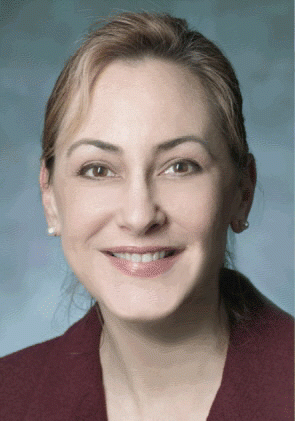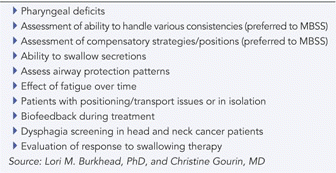Table 1 lists indications for MBSS.
Explore This Issue
February 2009According to Dr. Kraus and his colleagues, a potential disadvantage of this exam is that it is relatively expensive, because it requires the services of a radiologist as well as a speech pathologist.
Flexible Endoscopic Evaluation of Swallowing (FEES)
Newer than the MBSS exam, the FEES allows for the evaluation of laryngeal function, including vocal fold motion or atrophy and laryngeal lesions. The test uses a small scope that is placed through the nose and throat, which is used for visualizing the throat during swallowing. Performed generally by a speech-language pathologist or otolaryngologist, the test also permits evaluation of whether a patient is having trouble with his or her own secretions (unlike MBSS, which evaluates only barium-coated secretions). When sensory testing is added to this test, it is referred to as FEESST.
 MBSS really helps pinpoint which pharyngeal muscles or parts of the tongue are not working.
MBSS really helps pinpoint which pharyngeal muscles or parts of the tongue are not working.
-Christine Gourin, MD
I prefer the FEES or FEESST for head and neck cancer patients, said Dr. Burkhead, because I can evaluate the structures more clearly and determine the impact of mucositis or edema or tumor bulk on swallowing, something that MBSS cannot fully provide information about.
Other advantages of FEES, said Dr. Gourin, include its ability to assess minor degrees of laryngeal aspiration or residue remaining from ingested material that a patient may not sense or handle effectively. When the sensory part of the test is included, she said, another advantage is the ability to determine if the structures are insensate or respond appropriately to things like residue, as well as seeing if the patient can handle their own secretions.
A further advantage of this exam is that it is office-based, portable, and does not use ionizing radiation. This is beneficial particularly for patients who cannot readily be transported, such as patients in the intensive care unit, or for those who need repeat exams, said Dr. Burkhead.
Table 2 lists indications for FEES (or FEESST).
Reliability of Each Test
Along with recognizing that each test has unique characteristics that suggest its preferred utility to answer specific clinical questions or patient symptoms, it is important to bear in mind that there can be differences in the reliability of the results of each test. For example, compared with MBSS, FEES may overestimate swallowing problems and results must be interpreted in the context of the patient’s underlying condition, said Dr. Gourin. On the other hand, MBSS may underestimate the degree of dysphagia compared with FEES because of problems that won’t be apparent on MBS, such as trouble patients are having with secretions or laryngeal function.

Leave a Reply